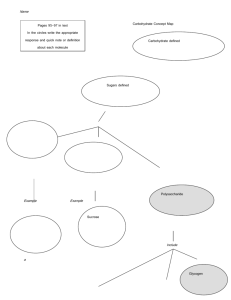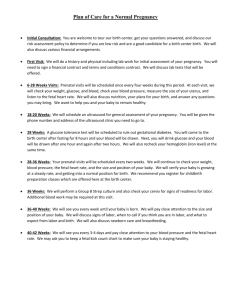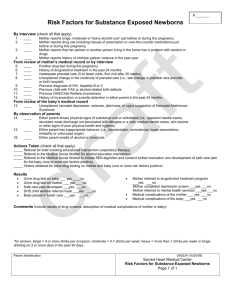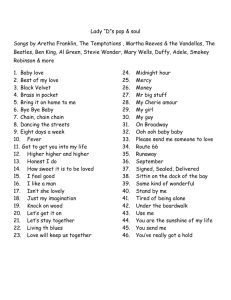M C A D
advertisement
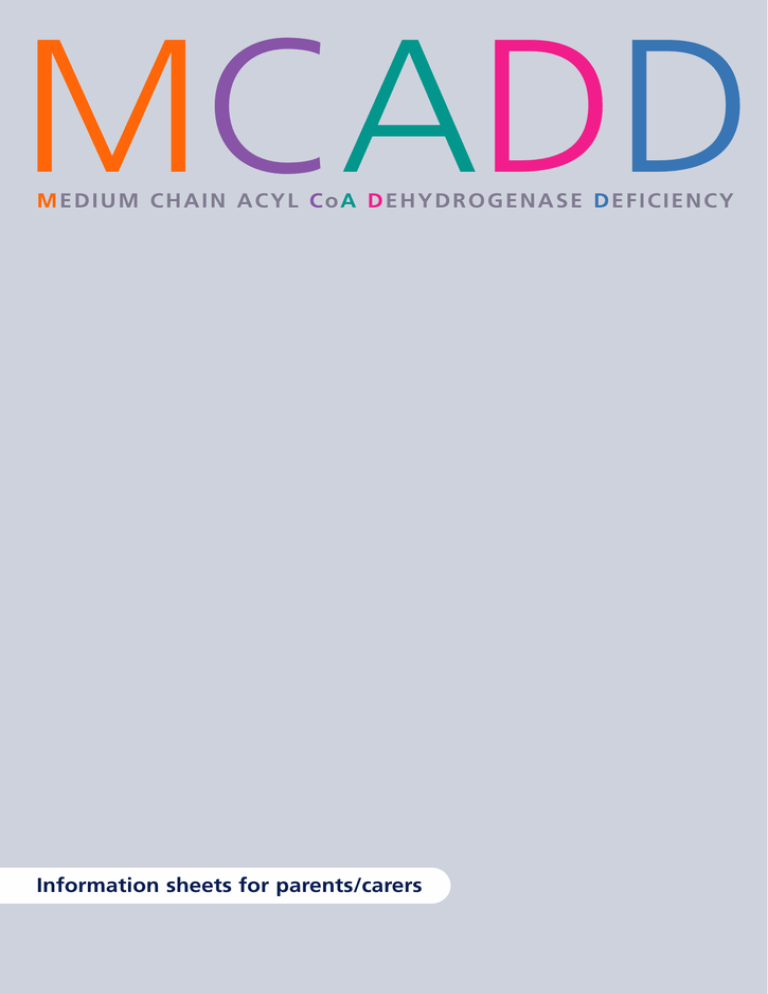
MCADD ME D I U M C HAIN ACYL CoA DEHYDROGENASE DEFIC I E N CY Information sheets for parents/carers Contents For all ages PAGE 1 Contact names, telephone and bleep numbers 3 Around 2 weeks old 2 Infant feeding: age under 1 year 4 3 Emergency Regimen: for infants age under 1 year 5 4 Emergency Regimen recipes: for infants age under 1 year – 10% Carbohydrate 6 4 to 6 months old 2 Weaning diet 7 1 year old 2 Children’s diet: from 1 year 8 3 Emergency Regimen: for children from 1 year 9 4 Emergency Regimen recipes: for children age 1 to 2 years – 15% Carbohydrate 10 5 Alternative Emergency Regimen drinks: for children age 1 to 2 years – 15% Carbohydrate 11 2 years old 2 Emergency Regimen recipes: for children age over 2 years – 20% Carbohydrate 12 3 Alternative Emergency Regimen drinks: for children age over 2 years – 20% Carbohydrate 13 10 years old 2 Emergency Regimen recipes: for children age over 10 years – 25% Carbohydrate 14 3 Alternative Emergency Regimen drinks: for children age over 10 years – 25% Carbohydrate 15 Dietetic products M E D I U M C H A I N 16 A C Y L C o A D E H Y D R O G E N A S E D E F I C I E N C Y – M C A D D 2 I N F O R M AT I O N S H E E T F O R PA R E N T S / C A R E R S 1 Contact names, telephone and bleep numbers Name Telephone Bleep/Pager Metabolic centre Consultant Consultant’s secretary Metabolic registrar Dietitian Ward Clinical nurse specialist Local hospital Consultant Consultant’s secretary Registrar Dietitian Ward M E D I U M C H A I N A C Y L C o A D E H Y D R O G E N A S E D E F I C I E N C Y – M C A D D 3 I N F O R M AT I O N S H E E T F O R PA R E N T S / C A R E R S 2 Around 2 weeks old Infant feeding: age under 1 year Does my baby need a special feed? No – you can breast feed or give normal infant formula. Why is regular feeding necessary? Babies with MCADD have a problem in making enough energy from their body fat stores when fasting (going without a feed) for too long. How long can my baby fast (go without a feed) for? • Your baby can fast for up to 6 hours. As your baby gets older they will be able to fast for longer. Newborn and young infants normally demand feed every 3 to 4 hours. When your baby begins to sleep longer at night, give a feed just before they go to bed, once during the night (you may need to wake your baby for this feed) and on waking in the morning. What should I do if my baby will not wake for a feed during the night? If your baby will not wake or take a feed during the night and is fasting for longer than the recommended time contact your hospital doctor for further advice. What are Medium Chain Triglycerides (MCTs)? These are a type of fat but not the main fat found in food. MCTs need to be avoided because your baby cannot readily use these to make energy. Do any feeds contain MCTs? Some specialised infant formulas contain added MCTs. If your baby is prescribed a specialised formula check with your Doctor or Dietitian it does not contain MCTs. What should I do if my baby becomes unwell and / or feeds poorly? Follow the Emergency Regimen (ER) plan (see ER information sheets). The ER is a special feeding plan: • glucose polymer feeds are given to provide your baby with energy • these feeds are given frequently day and night to reduce the length of time your baby fasts for. M E D I U M C H A I N A C Y L C o A D E H Y D R O G E N A S E D E F I C I E N C Y – M C A D D 4 I N F O R M AT I O N S H E E T F O R PA R E N T S / C A R E R S 3 Around 2 weeks old Emergency Regimen (ER): for infants age under 1 year What is the Emergency Regimen? This is a special feeding plan used if your baby is unwell and/or is not feeding well: • glucose polymer feeds are given to provide your baby with energy • these feeds are given frequently day and night to reduce the length of time your baby fasts for. When should I give the ER? Any time your baby is not feeding well, this is usually during illness Step 1: if you are unsure if your baby is unwell, give a glucose polymer feed and continue to assess Step 2: if your baby is definitely unwell, start the full ER of frequent glucose polymer feeds Step 3: if your baby is not getting better, not tolerating or refusing to take the glucose polymer feeds contact your hospital doctor or go to your local hospital. If you go to hospital take your A & E letter, ER information sheets, glucose polymer and scoops. Should I contact the hospital doctor if my baby is on the ER? Yes if: – you are concerned and want advice – your baby is frequently vomiting feeds – your baby has diarrhoea, unless very mild – your baby refuses ER feeds – your baby is drowsy, floppy, not responding normally (‘glazed look’) – your baby is not improving on ER feeds. How do I make the ER feeds? Glucose polymer powder is dissolved in cooled, boiled water to make the feed (see ER recipes for infants). How do I give the ER? Give feeds every 2 or 3 hours day and night. First try to give your baby’s usual formula. If this is not tolerated give the ER feeds of glucose polymer. If your baby is vomiting give small frequent sips of feed. My baby is breast fed – how do I give the ER? Try to breast feed every 2 to 3 hours day and night. If your baby is not breast feeding well try giving ER feeds of glucose polymer from a bottle. If your baby refuses a bottle contact your hospital doctor or go to your local hospital. When can I stop giving the ER feeds? As your baby starts to recover you can return to their normal feeds and routine. Try to do this within 48 hours of starting the ER feeds. Where do I get glucose polymer from? Glucose polymers eg Caloreen, Maxijul, Polycal, Polycose, Vitajoule are available on prescription from your GP. What are oral rehydration solutions? Doctors may prescribe oral rehydration solutions eg Dioralyte, Electrolade, Rapolyte to treat diarrhoea and vomiting. These solutions contain very little glucose, so glucose polymer should always be added to provide more energy (see ER recipes: for infants age under 1 year ). M E D I U M C H A I N A C Y L C o A D E H Y D R O G E N A S E D E F I C I E N C Y – M C A D D 5 I N F O R M AT I O N S H E E T F O R PA R E N T S / C A R E R S 4 Around 2 weeks old Emergency Regimen recipes: for infants age under 1 year 10% Carbohydrate Small volume recipe 20g or level unpacked scoops of *glucose polymer made up to 200ml with cooled boiled water. Or Large volume recipe 100g or level unpacked scoops *glucose polymer made up to 1000ml with cooled boiled water. Or Oral rehydration solution recipe 1 sachet of Dioralyte or Electrolade or Rapolyte add 200ml cooled boiled water add 15g or level unpacked scoops of *glucose polymer. * Caloreen, Maxijul, Polycal, Polycose, Vitajoule Suggested feed volumes Age 0-3 months Feed: 45-80ml every 2 hours or 70-120ml every 3 hours day and night Age 4-6 months Feed: 85-100 ml every 2 hours or 130-150ml every 3 hours day and night Age 7-9 months Feed: 90-100ml every 2 hours or 130-150ml every 3 hours day and night Age 10-12 months Feed: 100ml every 2 hours or 150ml every 3 hours day and night M E D I U M C H A I N A C Y L C o A D E H Y D R O G E N A S E D E F I C I E N C Y – M C A D D 6 I N F O R M AT I O N S H E E T F O R PA R E N T S / C A R E R S 2 4 to 6 months old Weaning diet: from around 6 months When can I wean my baby? You can wean your baby at the normal time around 6 months (26 weeks) of age. Does my baby need a special diet? No – wean your baby onto a normal diet. Your health visitor will be able to provide advice on normal weaning. Home cooked and/or commercial baby foods can be given. As weaning progresses try to give your baby starchy foods such as cereals, potato, pasta, rice, bread, or chapati at each main meal. These foods provide a good source of energy. When can I give my baby cows’ milk to drink? Your baby can have cows’ milk as a drink from 1 year of age. It is best to continue to breast feed or give infant formula until then. As solids increase your baby will take fewer milk feeds. Do any foods contain MCTs? MCTs are only found in a very few foods but not in sufficient quantity to cause a problem. Coconut is the only exception. Small amounts of coconut as an ingredient in a food may be given. Pure coconut and coconut oil should be avoided. How often to feed your baby How often do I need to feed my baby? It is still important your baby does not fast for too long overnight and feeds regularly during the day. At night continue to give your baby a feed just before they go to bed, once during the night (you may need to wake your baby for this feed) and on waking in the morning. How long can my baby fast for? Now your baby is getting older they can fast for longer overnight. Provided your baby is well and feeding normally they can fast for: • 8 hours from 4 months of age • 10 hours from 8 months of age. What should I do if my baby will not wake for a night feed? If your baby will not wake or take a feed during the night and is fasting for longer than the recommended time contact your hospital doctor for further advice. Feeding during illness What should I do if my baby becomes unwell and / or feeds poorly? Follow the Emergency Regimen (ER) plan (see ER information sheets). The ER is a special feeding plan: • glucose polymer feeds are given to provide your baby with energy • these feeds are given frequently day and night to reduce the length of time your baby fasts for. M E D I U M C H A I N A C Y L C o A D E H Y D R O G E N A S E D E F I C I E N C Y – M C A D D 7 I N F O R M AT I O N S H E E T F O R PA R E N T S / C A R E R S 2 1 year old Children’s diet: from 1 year Does my child need a special diet? No – your child can have a normal diet. Try to include starchy foods such as cereals, potato, rice, pasta, bread or chapati at each meal. These foods provide a good source of energy. Do any foods contain MCTs? MCTs are only found in a very few foods but not in sufficient quantity to cause a problem. Coconut is the only exception. Small amounts of coconut as an ingredient in a food may be given. Pure coconut and coconut oil should be avoided. How often to feed your child How often does my child need to eat? Your child can just eat normally. Give regular meals (3 main meals) and a bedtime snack. Does my child need to have snacks between main meals? No – these are not normally needed. How long can my child fast for overnight? Providing your child is well and feeding normally they can fast for: • 12 hours overnight. It is important to give a starchy bedtime snack eg cereal and milk, biscuits, sandwich and not to miss or have a late breakfast. What should I do if my child misses a meal? Missed meals should be replaced with a starchy snack or sugary drink (see Emergency Regimen recipes for children and Alternative Emergency Regimen drinks for children). Feeding during illness What should I do if my child becomes unwell and / or is not eating? Follow the Emergency Regimen (ER) plan (see Emergency Regimen information sheets for children). The ER is a special feeding plan: • glucose polymer drinks are given to provide your child with energy • these feeds are given frequently day and night to reduce the length of time your child fasts for. M E D I U M C H A I N A C Y L C o A D E H Y D R O G E N A S E D E F I C I E N C Y – M C A D D 8 I N F O R M AT I O N S H E E T F O R PA R E N T S / C A R E R S 3 1 year old Emergency Regimen (ER): for children from 1 year What is the Emergency Regimen? This is a special feeding plan used if your child is unwell and/or is not feeding well: • glucose polymer drinks are given to provide your child with energy • these feeds are given frequently day and night to reduce the length of time your child fasts for. When should I give the ER? Any time your child is not eating well; this is usually during illness Step 1: if you are unsure if your child is unwell, give a glucose polymer drink and continue to assess Step 2: if your child is definitely unwell, start the full ER of frequent glucose polymer drinks Step 3: if your child is not getting better, not tolerating or refusing to take the glucose polymer drinks contact your hospital doctor or go to your local hospital. If you go to hospital take your A & E letter, ER information sheets, glucose polymer and scoops. Should I contact the Hospital doctor if my child is on the ER? Yes if: – if you are concerned and want advice – your child is frequently vomiting feeds – your child has diarrhoea, unless very mild – your child refuses ER feeds – your child is drowsy, floppy, not responding normally (‘glazed look’) – your child is not improving on ER feeds. How do I make the ER drinks? Glucose polymer is dissolved in water to make the drinks (see ER recipes for children). How do I give the ER? Give glucose polymer drinks or alternative drinks every 2 or 3 hours day and night. If your child is vomiting give the drinks as small frequent sips. Can I give any other drinks? Yes – commercial drinks can be given but you may need to add extra glucose polymer (see Alternative ER drinks). Low calorie drinks are not suitable because they are too low in energy. When can I stop giving the ER drinks? When your child starts eating again you can give fewer ER drinks but continue some night drinks. ER drinks can be stopped once your child is eating normally again. Try to do this within 48 hours of starting the ER. Where do I get glucose polymer from? Glucose polymers eg Caloreen, Maxijul, Polycal, Polycose, Vitajoule are available on prescription from your GP. What are oral rehydration solutions? Doctors often prescribe oral rehydration solutions eg Dioralyte, Electrolade, Rapolyte to treat diarrhoea and vomiting. These solutions contain very little glucose, so glucose polymer should always be added to provide more energy (see ER recipes for children). M E D I U M C H A I N A C Y L C o A D E H Y D R O G E N A S E D E F I C I E N C Y – M C A D D 9 I N F O R M AT I O N S H E E T F O R PA R E N T S A N D C A R E R S 4 1 year old Emergency Regimen recipes: for children age 1 to 2 years 15% Carbohydrate Small volume recipe 30g or level unpacked scoops of *glucose polymer made up to 200ml with cooled boiled water. Or Large volume recipe 150g or level unpacked scoops *glucose polymer made up to 1000ml with cooled boiled water. Or Oral rehydration solution recipe (12% Carbohydrate) 1 sachet of Dioralyte or Electrolade or Rapolyte add 200ml cooled boiled water add 20g or level unpacked scoops of *glucose polymer. * Caloreen, Maxijul, Polycal, Polycose, Vitajoule Suggested drink volumes Age 1 to 2 years Aim 1200ml in 24 hours Offer: 100ml every 2 hours or 150ml every 3 hours day and night M E D I U M C H A I N A C Y L C o A D E H Y D R O G E N A S E D E F I C I E N C Y – M C A D D 10 I N F O R M AT I O N S H E E T F O R PA R E N T S A N D C A R E R S 5 1 year old Alternative Emergency Regimen drinks: for children age 1 to 2 years 15% Carbohydrate How to make 15% carbohydrate drinks (15g carbohydrate per 100ml) from commercial drinks Look at the nutrition information label per 100ml: if 9 to12g carbohydrate per 100ml: add level scoop *glucose polymer per 100ml eg Fruit juices Fruit Shoot and Fruit Shoot 100% (all flavours) J2O (all flavours) Carton Ribena – (original blackcurrant, strawberry, apple) Fizzy drinks eg: Coca Cola, Fanta, Sprite, 7UP, Pepsi Regular 13-16g carbohydrate per 100ml – can be used eg 15% glucose polymer drink – add squash to flavour 1 sachet Maxijul (132g) add water up to 800ml * Caloreen, Maxijul, Polycal, Polycose, Vitajoule UPDATED APRIL 2008 PLEASE NOTE: The sugar content of commercial drinks can change! Always check the label (home and abroad). Low calorie drinks eg: Diet, Lite, No added sugar, Sugar free should not be substituted for sugary drinks because they are too low in energy. Artificial sweeteners do not provide calories. M E D I U M C H A I N A C Y L C o A D E H Y D R O G E N A S E D E F I C I E N C Y – M C A D D 11 I N F O R M AT I O N S H E E T F O R PA R E N T S A N D C A R E R S 2 2 years old Emergency Regimen recipes: for children age over 2 years 20% carbohydrate Small volume recipe 40g or level unpacked scoops of *glucose polymer made up to 200ml with cooled boiled water. Or Large volume recipe 200g or level unpacked scoops *glucose polymer made up to 1000ml with cooled boiled water. Or Oral rehydration solution recipe (12% Carbohydrate) 1 sachet of Dioralyte or Electrolade or Rapolyte add 200ml cooled boiled water add 20g or level unpacked scoops of *glucose polymer. * Caloreen, Maxijul, Polycal, Polycose, Vitajoule Suggested drink volumes Age 2 years: aim 1200ml in 24 hours Offer 100ml every 2 hours or 150ml every 3 hours day and night Age 3 and 4 years: aim 1300ml to 1400ml in 24 hours Offer 110ml every 2 hours or 170ml every 3 hours day and night Age 5 and 6 years: aim 1500ml to 1600ml in 24 hours Offer 130ml every 2 hours or 200ml every 3 hours day and night Age 7 and 8 years: aim 1700ml in 24 hours Offer 135ml every 2 hours or 210ml every 3 hours day and night Age 9 years: aim 1800ml in 24 hours Offer 150ml every 2 hours or 220ml every 3 hours day and night M E D I U M C H A I N A C Y L C o A D E H Y D R O G E N A S E D E F I C I E N C Y – M C A D D 12 I N F O R M AT I O N S H E E T F O R PA R E N T S A N D C A R E R S 3 2 years old Alternative Emergency Regimen drinks: for children age over 2 years 20% carbohydrate How to make 20% carbohydrate drinks (20g carbohydrate per 100ml) from commercial drinks Look at the nutrition information label per 100ml: if 9 to 12g carbohydrate per 100ml: Add level scoops *glucose polymer per 100ml eg Fruit juices Fruit Shoot and Fruit Shoot 100% (all flavours) J2O (all flavours) Carton Ribena – (original blackcurrant, strawberry, apple) Fizzy drinks eg: Coca Cola, Fanta, Sprite, 7UP, Pepsi Regular if 13 to 16g carbohydrate per 100ml: Add level scoop *glucose polymer per 100ml 17 to 20g carbohydrate per 100ml – can be used eg 20% glucose polymer drink add squash to flavour 1 sachet Maxijul (132g) add water up to 600ml Lucozade Energy (all flavours), not sport variety Tesco Active sparkling orange drink, not isotonic variety * Caloreen, Maxijul, Polycal, Polycose, Vitajoule UPDATED APRIL 2008 PLEASE NOTE: The sugar content of commercial drinks can change! Always check the label (home and abroad). Low calorie drinks eg: Diet, Lite, No added sugar, Sugar free should not be substituted for sugary drinks because they are too low in energy. Artificial sweeteners do not provide calories. M E D I U M C H A I N A C Y L C o A D E H Y D R O G E N A S E D E F I C I E N C Y – M C A D D 13 I N F O R M AT I O N S H E E T F O R PA R E N T S A N D C A R E R S 2 10 years old Emergency Regimen recipes: for children age over 10 years 25% carbohydrate Small volume recipe 50g or level unpacked scoops of *glucose polymer made up to 200ml with cooled boiled water. Or Large volume recipe 250g or level unpacked scoops *glucose polymer made up to 1000ml with cooled boiled water. Or Oral rehydration solution recipe (12% Carbohydrate) 1 sachet of Dioralyte or Electrolade or Rapolyte add 200ml cooled boiled water add 20g or level unpacked scoops of *glucose polymer. * Caloreen, Maxijul, Polycal, Polycose, Vitajoule Suggested drink volumes Age 10 years: aim 1800ml in 24 hours Offer 150ml every 2 hours or 220ml every 3 hours day and night Age 11, 12 and 13 years: aim 2000ml in 24 hours Offer 170ml every 2 hours or 250ml every 3 hours day and night Age 14 and 15 years: aim 2200ml in 24 hours Offer 180ml every 2 hours or 270ml every 3 hours day and night Age 16, 17 and 18 years: aim 2400ml in 24 hours Offer 200ml every 2 hours or 300ml every 3 hours day and night M E D I U M C H A I N A C Y L C o A D E H Y D R O G E N A S E D E F I C I E N C Y – M C A D D 14 I N F O R M AT I O N S H E E T F O R PA R E N T S A N D C A R E R S 3 10 years old Alternative Emergency Regimen drinks: for children age over 10 years 25% carbohydrate How to make 25% carbohydrate drinks (25g carbohydrate per 100ml) from commercial drinks Look at the nutrition information label per 100ml: if 9 to 12g carbohydrate per 100ml: Add level scoops *glucose polymer per 100ml eg Fruit juices Fruit Shoot and Fruit Shoot 100% (all flavours) J2O (all flavours) Carton Ribena – (original blackcurrant, strawberry, apple) Fizzy drinks eg: Coca Cola, Fanta, Sprite, 7UP, Pepsi Regular if 13 to 16g carbohydrate per 100ml: Add level scoop *glucose polymer per 100ml if 17 to 20g carbohydrate per 100ml: level scoop *glucose polymer per 100ml Add eg 20% glucose polymer drink add squash to flavour 1 sachet Maxijul (132g) add water up to 600ml Lucozade Energy (all flavours), not sport variety Tesco Active sparkling orange drink, not isotonic variety 25% carbohydrate drink 25% glucose polymer drink add squash to flavour 1 sachet Maxijul (132g) add water up to 500ml * Caloreen, Maxijul, Polycal, Polycose, Vitajoule UPDATED APRIL 2008 PLEASE NOTE: The sugar content of commercial drinks can change! Always check the label (home and abroad). Low calorie drinks eg: Diet, Lite, No added sugar, Sugar free should not be substituted for sugary drinks because they are too low in energy. Artificial sweeteners do not provide calories. M E D I U M C H A I N A C Y L C o A D E H Y D R O G E N A S E D E F I C I E N C Y – M C A D D 15 I N F O R M AT I O N S H E E T F O R PA R E N T S / C A R E R S Dietetic products PRODUCT MANUFACTURER Caloreen Nestle Maxijul SHS/Nutricia Polycal Nutricia Polycose Abbott Laboratories Vitajoule Vitaflo Dioralyte Sanofi-Aventis Electrolade Thornton and Ross Raployte KoGEN M E D I U M C H A I N A C Y L C o A D E H Y D R O G E N A S E D E F I C I E N C Y – M C A D D 16
